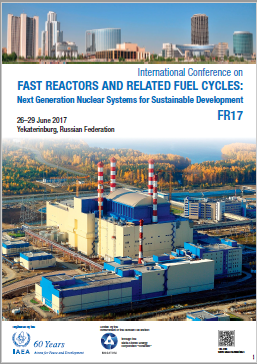Speaker
Mr
Jakub Lüley
(Slovak University of Technology)
Description
Presented paper assess standard reactivity effects, as coolant void effect and Doppler effect, of the power scale Gas cooled Fast Reactor (GFR 2400) in a comprehensive manner by application of the perturbation theory. To achieve high validity of the results the conventional SCALE 6 system and adapted computational scheme (ACS) are utilized. The ACS is based on standard computational package incorporating codes like TRANSX, PARTISN, DIF3D, PORK and STUUP with cross section data library optimized for fast reactor applications. The reactivity effects of the GFR 2400 core were calculated in a range of the pre-defined temperatures and coolant pressures. Coolant void effect for nominal and lowest operational pressure and Doppler effects for highest temperature increase and decrease were identified as most important reactivity effects. Spatial distribution and reactivity components decomposition of the selected reactivity effects is analyzed and presented in this paper for further evaluation. In the next step, sensitivity and uncertainty analysis is performed for these reactivity effects where the sensitivity coefficients are validated via direct perturbation calculation and energy profile comparison. In case of possible optimization of selected reactivity effects the most sensitive isotopes and contributors to the overall uncertainty are identified. The final part of the paper is dedicated to the first optimization studies and preliminary results are presented. Two possible options of optimizations are proposed; homogeneous and heterogeneous. In the heterogeneous case the rod follower volume is used for application of materials which can possibly influence the reactivity effects. In the second case the core design modifications are homogeneously distributed over the entire core volume. Finally in the conclusion recommendations and some drawbacks are collected for further analyses.
Country/Int. Organization
Slovakia/Slovak University of Technology in Bratislava, Institute of Nuclear and Physical Engineering
Author
Mr
Jakub Lüley
(Slovak University of Technology)
Co-authors
Dr
Branislav Vrban
(B&J NUCLEAR ltd.)
Prof.
Ján Haščík
(Slovak University of Technology)
Dr
Štefan Čerba
(Slovak University of Technology in Bratislava)

